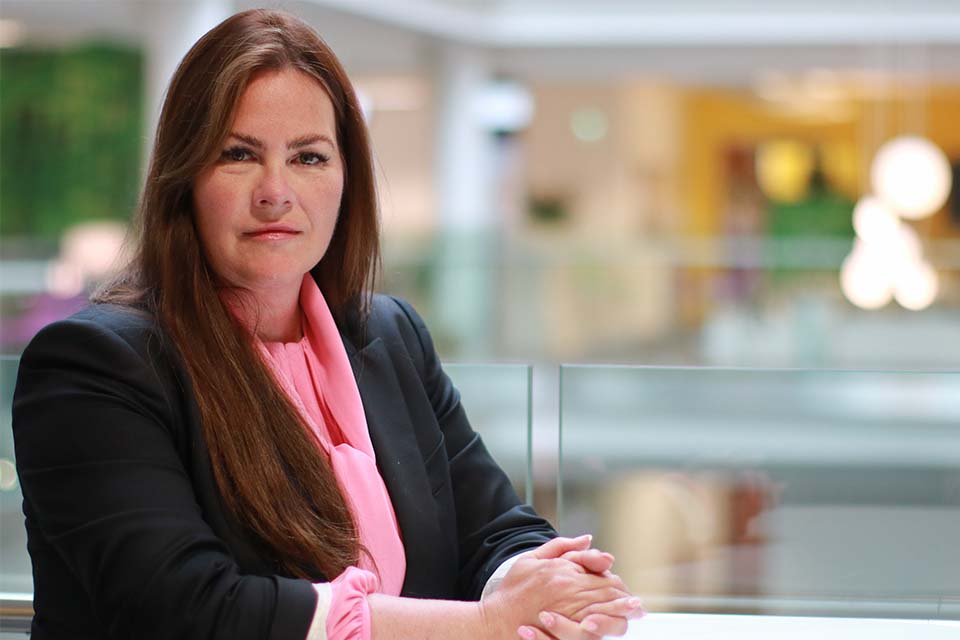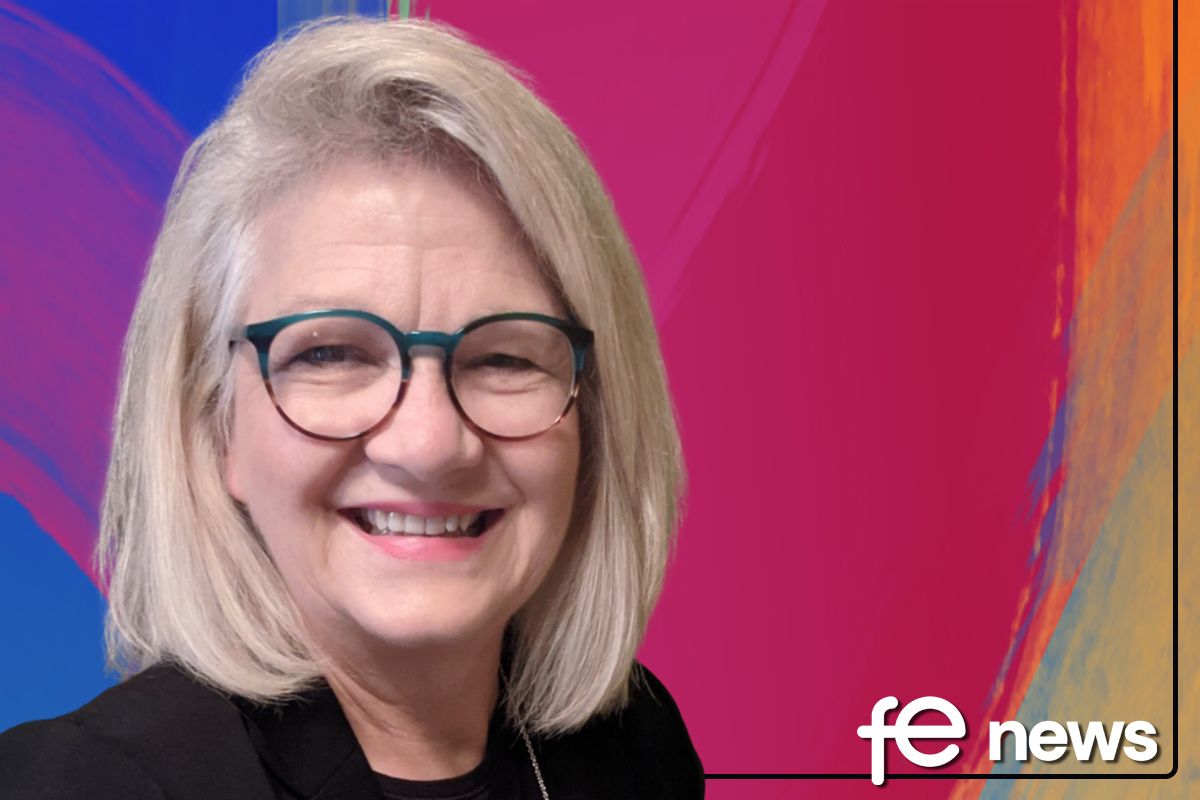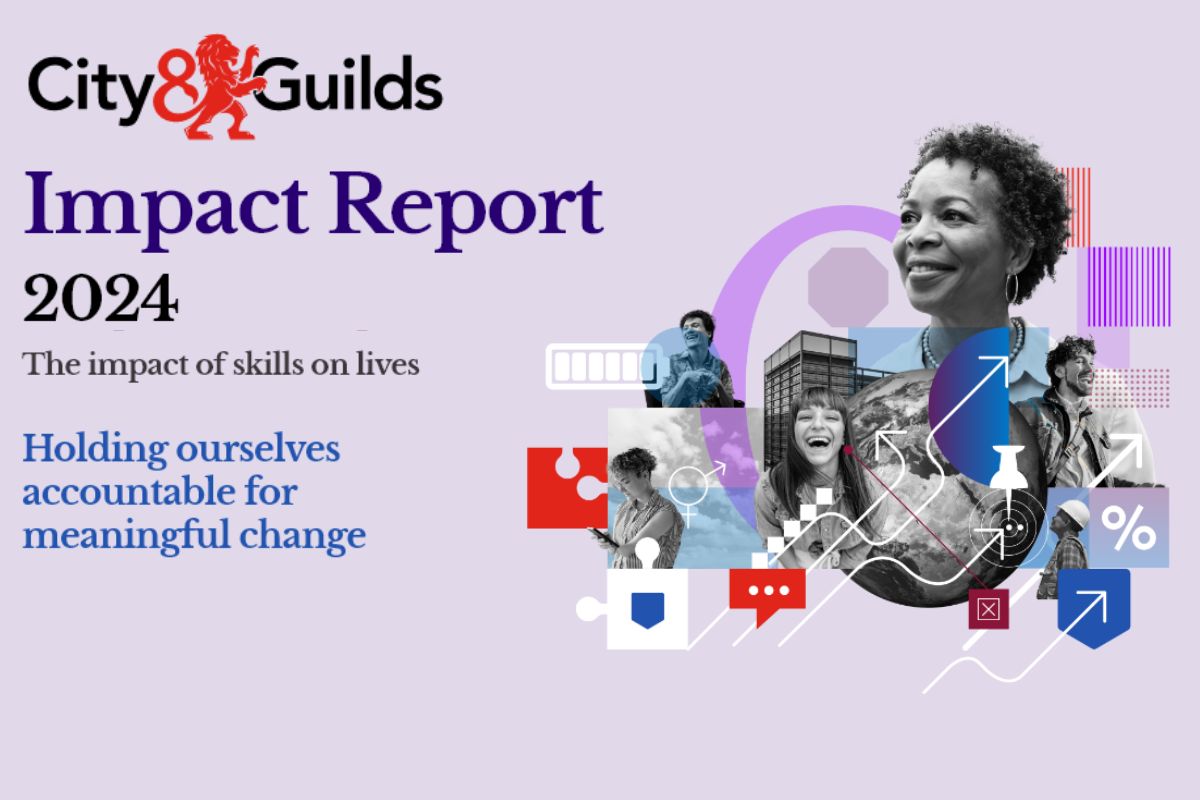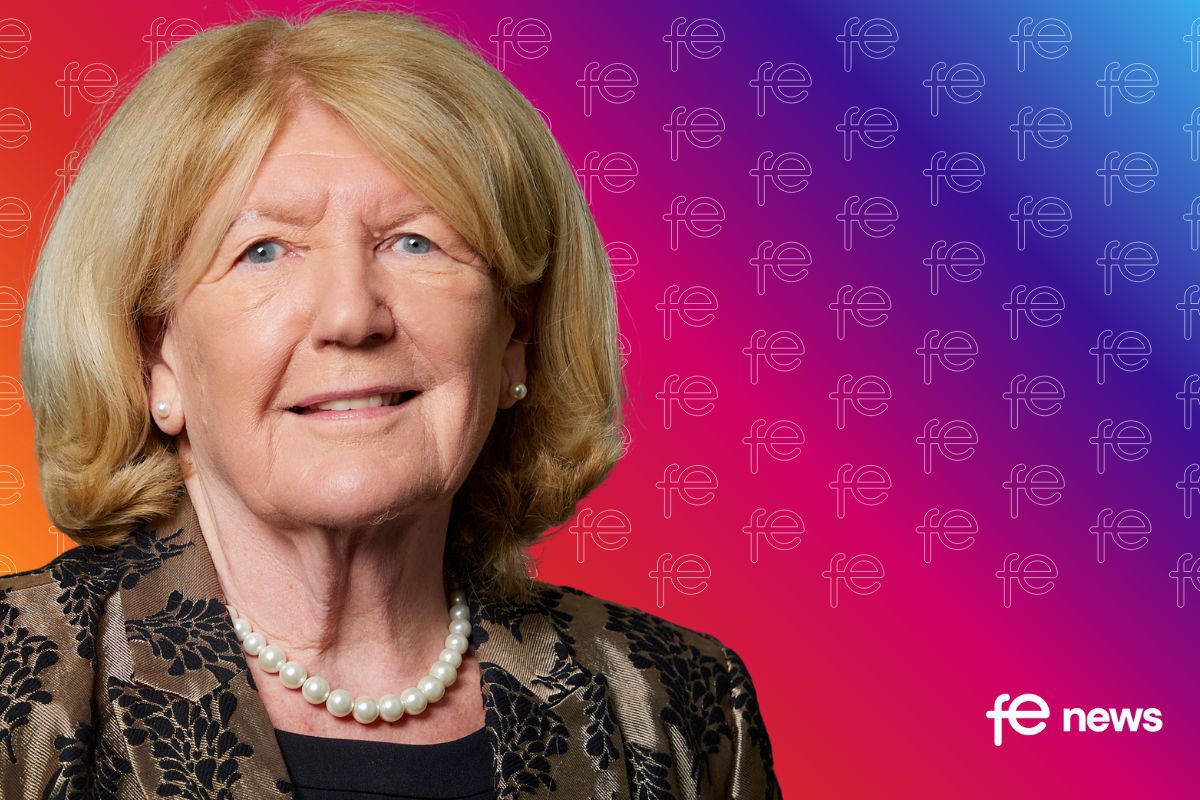Our ‘Goldilocks’ duty is to make sure that there are neither too many qualifications, nor too few

Dr Jo Saxton’s speech at 2022 ASCL conference
Yesterday, I was 12 miles up the road in Walsall. It was a powerful afternoon talking to students, staff and leaders about how this past two years has been for them; hearing about the challenges they’re facing, as well as talking about qualifications and exams. Among other things, I was particularly struck by hearing about a lad who is one of 16 siblings, and that his family had one laptop to share between them during the lockdown period. Nevertheless, now he’s able, this lad is staying at school for two hours extra each day, because he’s so keen to do himself justice in his exams.
I met some heroic local leaders, who describe themselves as “normally pro exam”, but right now fighting to get kids into school, struggling to staff their schools.
To them, and to you, I want to say that I see how awful it’s been; I see how difficult it continues to be. I am doing everything I can to listen to get the arrangements for this year right for you and the students that you serve. The package that we’ve put in place has been developed with leaders like you, and your communities in mind.
It’s precisely because of students such as Ashley, Jamie, Katie and Theo, who I met yesterday, that I have made it my mission to make sure we are being as fair as we possibly can.
Ashley and Jamie are eloquent about what they’ve missed. But they’re also adamant that they “don’t want people looking down on [their] results”.
In fact – they’re angry that the GCSE grades they were awarded in 2020 are doubted by some. Ashley was very clear he doesn’t want to go to university not having done public exams.
This is something I’ve heard students saying up and down the country. I’ve been trying really hard to focus on listening to what students are feeling and what they want.
Yesterday’s visit was the latest in a series of conversations with over 50 leaders across 40 schools and colleges, some in person, some remotely. My mission is to listen to staff, listen to students and, where they come in to talk, also with parents.
It would be all too easy in this role to spend all of my time caught up in technical and complex arguments, in the minutiae of one policy detail or another, and not make time to speak and listen to the people who matter the most. You, and your students.
And so, while it presents challenges, for me it’s the most important part of what I do. By the time the summer exam series starts I will have visited schools and colleges from Plymouth to Durham and, to date, I’ve spanned Kent and Lancashire.
It’s very clear that, as a nation, we perhaps have never valued the work of our schools and colleges more than we do now. Throughout the pandemic our teachers and support staff have shown incredible dedication and determination. Our pupils have shown endurance and, despite it all – despite increased anxieties and worries which I hear about everywhere I go – nevertheless enthusiasm to get on and show what they can do.
While we all want to get back to normal, it’s palpably clear that we’re not there yet. As a head I met yesterday, Jacqui, put it: “we’re just not in the same place that we were.”
Students know they have missed a lot, and they know that what they’ve missed isn’t only educational. They have a huge amount to catch-up on, not just curriculum content. And for that reason, even though there are some voices – including some in this room – calling for a more direct return to ‘normal’ in terms of qualifications, I resisted.
Students deserve – and want – the level playing field that exams allow, but it’s only right that we get there by giving them every reasonable form of support we can to [reintroduce] this form of assessment.
2022
In taking up the job as Chief Regulator, I have been very clear that I want Ofqual to regulate in the interests of students. That’s because I am an educator at heart, and a former school leader. Qualifications are only meaningful if they are for somebody.
But what does that actually mean, specifically in terms of the arrangements put in place for this summer’s exams?
Well, it means that we’ve worked with government and awarding organisations to find a balance. A careful and delicate balance, that had to be found to ensure as smooth a path back to normality as possible. That has meant taking full account of:
fairness to students taking qualifications not just this year, but thinking about the relationship with previous and future years
thinking about how to respond at a national level to what in reality was a very varied impact of the pandemic on students – varied even from classroom to classroom in the same school
and amidst all of this, making sure that qualifications remain meaningful and genuinely show what students know, understand and can do
Forgive me if you’re familiar with this, but please allow me to summarise exactly what that means we’re doing this year.
For GCSEs, AS and A levels, it’s through a package of support. It’s made up of several elements:
greater flexibility in some subjects through changes to non-exam assessment and field work
less content or fewer topics in some subjects
the innovation of advance information for most subjects that will support revision
and formulae and equation sheets for some exams
These changes have been carefully considered as different subjects are assessed in different ways. A one-size-fits-all approach would not have worked for everything. Though I am acutely aware, from talking to students, that the package isn’t straightforward, particularly making the most of advance information.
The one aspect of the package that applies across all subjects is the approach to grading.
This year will be a transition year. We want to get back to pre-pandemic grading arrangements, not least because it’s what examiners best understand, but I don’t think it would be fair to do it in one fell swoop.
So, in 2022, rather than going straight back, results will reflect a staging post between 2021 and 2019. This will act as a safety net for those students who might otherwise just miss out on a higher grade. 2022 national results are likely to be higher than in 2019, but not as high as in 2021.
As in any other year, grade boundaries will be set at a national level, but only after students have taken their exams, and only after their papers have been marked. What we are securing is generous, or sensitive, grading, not generous marking. Students’ responses will be marked in line with the mark schemes for that paper and specification, as in any year. And examiners are not going to adjust for advance information. They’ll have to work with the mark schemes in front of them, they have to judge the work on its own merits, using the mark schemes.
Once set, grade boundaries will apply to all students, regardless of the school or college where they take their exams.
As in any normal year, exam boards will also use data as a check and balance to support fairness. This is for two reasons: to align standards in a subject, and to smooth out differences between boards. This is vital; one of the most important things Ofqual does. We make sure students are not advantaged or disadvantaged depending on the exam boards they’re sitting with.
The data will be based on an average of 2019 and 2021 results by subject. As in any other year, the grade boundaries for each specification will be set by senior examiners, after they have reviewed work produced by students. And all of this is overseen by Ofqual. I’ve been lucky enough to get some experience of how that works through the autumn series, which has recently presented its results.
Students’ grades, as in any other years when exams took place, will be based on how many marks they achieve. As you know, one of the good things about general qualifications is that there are a number of ways that you can gain marks across the paper. Students also get these marks irrespective of which centre they attend, irrespective of historical results in that centre.
The whole package – less content, advance information, the approach to grading – is the fairest way we could support the return to normal this year. I am confident that it strikes a balance between responding to the disruption caused by the pandemic and the drive to get back to normal.
We have heard calls for an approach that somehow takes account of the differential impact of the pandemic on education – regional grading perhaps, or some sort of individual COVID uplift for those students most affected during their course.
Intuitively, I hear and understand the desire for such compensation – it doesn’t feel fair that some students have been more affected by the pandemic than others. But we all know that Covid has affected students to different degrees – it’s not just regionally but under the same rooves of the same schools. It wouldn’t be possible to compensate for that differential impact on learning by changing the approach to grading. There is no way that we could do it that would be objectively fair. So we’ve put this package in place.
I’ve thought long and hard about what a qualification does and doesn’t do – what it’s for. Is it a measure of potential or is it a measure of attainment? Qualifications will only serve young people in the long term if they give a reliable indication of what a student knows, understands and can do.
I’ve met students at college right now on what they call ‘Covid grades’. Some of the students I spoke to last week are realising that their apprenticeship is further away than they thought because they have more maths to do than their grades indicated. As a society we won’t recover from this tragic pandemic if students receive grades that aren’t linked to what they know and can do. To do so undermines the value of a qualification as a key to a next phase.
It is in this context that the package of support for GCSEs, AS and A levels has been agreed: it is a balance between an approach to grading that is sensitive to the circumstances of the last two years, and making sure that qualifications still mean something. A balance that gives students the agency they’re calling for and shows that they have earned their qualifications. At the same time, giving them every reasonable form of support we can without dissolving the integrity of that qualification.
Contingency
Although it feels as though we’re entering a new phase in the pandemic – with restrictions lifted and some semblance of normality returning, like being able to be together today – our experiences over the last two years have shown us the unpredictability of the pandemic.
And so, it’s essential – even with the government fully committed to exams going ahead this summer – that we have contingency arrangements in place. For GCSEs, AS and A levels this means teacher assessed grades would be used if exams could not go ahead.
One of the messages I wanted to give you today is that there is no secret date. We aren’t sitting there knowing that on ‘x’ date, we’re going to say: now turn all that evidence into a TAG. I hope I can give you that reassurance. Indeed, everybody hopes that we will not need to do that.
By their very nature, no one wants contingency arrangements to be used, but they’re there for the worst-case scenario. Many of you will have had students who felt very uncomfortable last year when they didn’t know what provision for the worst-case scenario would be. And so, allow me, if I may, to emphasise that you can be proportionate in how you administer, or finish off, those contingency arrangements.
Do what you know to be right for your students, and within the cycle and rhythm of what works in your setting. Our guidance suggested 3 assessment points, not because you have to do that; more to suggest don’t have 6 (or 8, 9, even 12 as we saw in some settings last year). Our guidance referred to the summer term not as an instruction, but because students keep learning and making progress, and I know from speaking to them that, in the worst-case scenario, they didn’t want to be pinned to how they were performing in the autumn or at Christmas. They wanted a bit longer. But if you don’t think you need to collect further evidence after Easter, don’t.
What our guidance is trying to encourage is another balance – between having materials that could support a grade if needed, but that might also play a part in helping prepare students for formal exams and assessments.
And while no one enjoys mocks, I’ve yet to meet a student who hasn’t found the experience of mocks useful – increasing the familiarity of what the real thing will be like is so important. This is a cohort for whom, in many cases, the only people they know who have done exams are their teachers. The more we can do to reduce their concerns by increasing certainty, the better. That’s what a number of the resources we’ve published on our website are aiming to do; help you increase certainty for your students.
Vocational
I want to turn now to vocational and technical qualifications.
This is an area that I care passionately about. The trust that I ran offered a whole range of qualifications, as most of you will also do. It was always so thrilling to see young people develop specialist skills, and take their first steps into exciting careers.
I am thinking here of Lilly, an apprentice baker, now working in a bakery at a national supermarket. And Jamal, who overcame a looked-after background, now working in the music industry having studied music tech at one of our academies.
So that more Lillys and Jamals can access these opportunities, for 2022, Ofqual is regulating so that awarding organisations can make adaptations to assessments and qualifications, where they need to, in response to the impact of the pandemic. For those who want to know more, there’s a Contingency Regulatory Framework for vocational and technical qualifications that enables this flexibility published on our website. It allows awarding organisations to put in place arrangements that work best for the diverse range of qualifications and assessments that they offer.
Accordingly, there are slightly different contingency arrangements for vocational and technical qualifications. Teacher assessed grades would be used for those qualifications most similar to GCSEs and A levels. Those qualifications that require students to demonstrate occupational and professional competence, would be accommodated around any public health circumstances.
2023
From my conversations with schools and college leaders over the last few months, I know that many of you are turning your minds to 2023 and what this will mean for your current Year 10s and 12s.
The government has been clear that it is fully committed to exams and other assessments going ahead in 2023.
When we announced the grading arrangements for this year, we confirmed that in 2023, we would aim to return to normal results: those in line with pre-pandemic years. As you would expect, we will carefully review qualification outcomes in 2022 and we will continue to watch the path of the pandemic and its impact closely, because I need to be sure that we get the approach to grading absolutely right for students. I’ve been talking to year 10s and 12s on some of the school visits that I do. I understand that they are really conscious of the things they’ve missed. Not just in lockdowns.
The broader landscape
You would expect Ofqual as regulator of qualifications to have a strong focus on the summer exam series, and we do, particularly as we’re now returning to exams after two years without them. But Ofqual is about so much more than overseeing the delivery of exam series.
There is sometimes misconception about Ofqual’s role – that we are responsible for subject content, or for ensuring that centres offer certain qualifications. In fact, we are responsible for setting rules that awarding organisations must follow in order to offer regulated qualifications.
It’s also our responsibility to make sure the content requirements, as set out by the government, are met in those qualifications.
When awarding organisations do not meet our rules, we will hold them to account.
We can, and do, take regulatory action when it’s required.
The last couple of years have been extraordinary in terms of how Ofqual has had to regulate. It’s had to completely rethink the traditional ways of delivering its duties. As, indeed, has been the case in almost every aspect of life.
Ofqual has a range of statutory objectives – these include securing qualification standards and promoting public confidence in regulated qualifications. Sometimes these objectives can be in tension – again we’re back to that idea of finding a balance. I don’t think the pressure on that balance has ever been as great as during the pandemic.
Most people who know a bit about Ofqual are familiar with our role to secure standards and promote public confidence. Our other objectives tend to be less well known.
If I look back, one of my favourite places to be in a school is the early years. I loved being with the very youngest children as they built their vocabulary and understanding of the world around them.
Working on the EYFS curriculum was always a joy to me; the reading and playing with children, engaging in stories and songs, bringing spoken and written traditions to life.
To arrive at Ofqual and find that we are empowered with what the team describe as the ‘Goldilocks duty’ was a pleasant surprise. The Goldilocks duty, a colloquial name for one of our statutory objectives, is to promote the range and benefits of regulated qualifications. We have a statutory requirement to make sure there are not too many and not too few.
It’s this objective which sits behind Ofqual’s role in the level 3 qualifications review. Recently, we published a consultation on how we should regulate these qualifications and I would welcome you responding to it.
I support the government’s intention to increase confidence in level 3 qualifications and Ofqual shares the government’s ambition to create a world-class post-16 education system, with both technical and academic routes. These level 3 qualifications already serve a wide range of students with a wide range of needs and ambitions. And I’ve no doubt that all of us here today want there to be clear opportunities for students so that they can progress from high-quality qualifications into further study or skilled employment.
With any qualification reform, it is a non-negotiable that implementation is done carefully and sensitively with particular attention on who the qualifications are for. That is the lens through which I will look at everything I do at Ofqual. In particular the most vulnerable, and those with particular protected characteristics, those are the students that most need qualifications of the highest quality. They must be fit for purpose. They must enable clear, secure choices at the end. So consideration of the benefits and impacts our regulations can bring for these students is a particularly important part of the consultation for us.
The Secretary of State announced in November last year that the government would delay the reform timetable by a year. We welcome this longer timescale. It seems to me that just as with exams this year, with the reform to qualifications, education just needs time to recover. We all need time to catch our breath and take the next step calmly, confidently and with great care.
Our ‘Goldilocks’ duty then, is to make sure that there are neither too many qualifications, nor too few. We need just the right amount of the right quality. It’s about finding that delicate balance.
As you’re well aware, T Levels are beginning to play an important part in the landscape, and I’m reassured by ministers’ statements that none of us is looking at a binary system of A levels and T Levels. Ofqual, for its part, was involved in their design and development, and we continue to work with the Institute as these qualifications and new ones come to market.
I’m excited too, about the positive power that regulation can bring to those who want to pursue an apprenticeship route. Apprentices at Morecambe and Lancashire college were making the most of fluid routes between specialisms so that their own portfolios – and opportunities – could be as wide as possible.
I’m going to continue to champion choice like that for students. Choice which means that, as I found back up the road in Walsall – this time at a college – armed with their T Levels, BTECs and A levels, youngsters (and indeed one learner of 90 years old) were choosing between employment, apprenticeships and university.
So while it might not make for the most exciting headlines, the message I want to leave with you today is about choices that strike that balance:
- balance between returning to normal vs finding the right support for students who have been through a truly horrendous few years
- balance between having contingency plans that are there in the back pocket just in case, but that help rather than hinder qualification readiness
- and an enduring challenge for Ofqual, finding and striking the right balance between our statutory objectives so that the choice – and quality of qualifications – remains just right
I know, from being in your shoes, that being an educator is the very definition of being a high-wire tightrope walker, with daily challenges in finding the right balance between often competing demands.
I hope that by sharing this thinking, I can help foster a greater understanding and insight into what Ofqual does, and why we made certain decisions.
And of course, all of this is wrapped up in something that unites us all – beyond this room and the sector: the balance between really wanting to get back to normal, but needing to do so carefully, cautiously and with confidence.











Responses